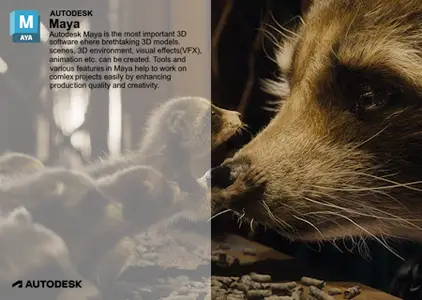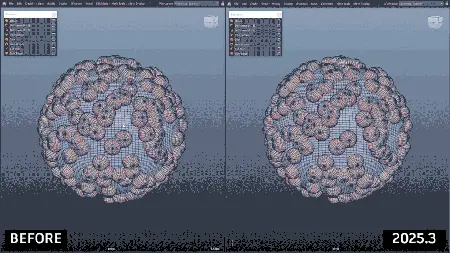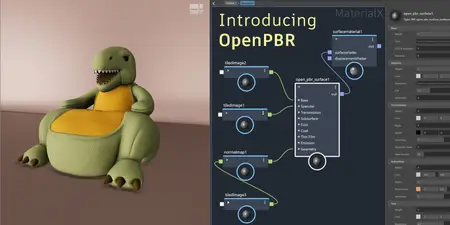Autodesk Maya Products 2025.3 with Updated Extensions (x64)

Free Download Autodesk Maya Products 2025.3 with Updated Extensions | 6.7 Gb
Languages Supported: English, 日本語, 简体中文
Owner:Autodesk Inc.
Product Name:Maya & Maya Creative
Version:2025.3 with Updated Extensions *
Supported Architectures:x64
Website Home Page :www.autodesk.com
Languages Supported:multilanguage
System Requirements:Windows **
Size:6.7 Gb
Autodesk_Maya_2025_3_ML_Windows_001_002.exe
Autodesk_Maya_2025_3_ML_Windows_002_002.7z
MayaUSD_0.30.0_Maya2025.3_Windows.exe
Autodesk_Maya_2025_3_Update_DEVKIT_Windows.zip
Autodesk_Maya_Creative_2025_3_ML_Windows_64bit_db_001_002.exe
Autodesk_Maya_Creative_2025_3_ML_Windows_64bit_db_002_002.7z
Autodeskhas releasedMaya Products 2025.3, the new version of its 3D software for visual effects, animation and game development. This update to the 3D animation tool reworks Boolean modeling, and introduces OpenPBR support and interesting new simulation features.
What's new in Maya 2025.3

Maya 2025.3 introduces support for OpenPBR, the Autodesk co-developed open material standard, used in this demo scene created by look dev artist Nikie Monteleone.
Maya 2025.3 introduces support for OpenPBR, the Autodesk co-developed open material standard, used in this demo scene created by look dev artist Nikie Monteleone. The update reworks Maya's Boolean algorithm, making Boolean modeling operations more reliable on complex models and those with problem geometry. It is also now possible to work with OpenPBR materials in Maya, thanks to the support for the new open material standard in both the LookdevX toolset and the Arnold renderer. Simulation toolset Bifrost for Maya gets a new option to 'wedge' simulations in the cloud.

3D modeling: new, more reliable Boolean algorithm
Key changes in Maya itself include an update to Boolean modeling. The software's Boolean algorithm has now been updated to match the one in 3ds Max, also improving the predictability and reliability of Boolean operations. According to Autodesk, the improvement is quite significant: in its internal tests, the old Boolean system would fail in 6% of cases, reduced to 0% with the new algorithm. The change should be most noticeable on problem geometry, such as meshes with coincident vertices or coplanar faces, and on complex Booleans with multiple source meshes.
Animation: workflow updates to the Graph Editor
Animators get workflow updates to the Graph Editor. Change include a new Auto-resize keys on zoom option, which resizes keys when zooming out, and new settings to control the appearance of tangent handles in the Graph view.

LookdevX: support for the new OpenPBR material standard
Outside the core application, there are updates to the key plugins included with Maya, including LookdevX, the new look dev toolset introduced in Maya 2024. The big change in LookdevX for Maya 1.6.0 is support for OpenPBR, the new open material standard developed by Autodesk and Adobe. A unified successor to the Autodesk Standard Surface and Adobe Standard Material, it is intended to increase interoperability between of material between CG applications. Other changes include the option to save compounds - groups of nodes within the shading graph - for reuse in future projects, or to share with collaborators. There are also three new gradient types, Radial, Circular and Box, in the Ramp node.
Arnold for Maya 5.4.5: a wide-ranging update
OpenPBR is also now supported in Maya's integration for the Arnold renderer. Arnold for Maya 5.4.5 introduces a new OpenPBR Surface shader, and tools to convert Arnold's aiStandardSurface shaders to OpenPBR Surface. The release also updates Arnold's own Ramp shaders, which get new 3D ramp modes, and the option to add procedural noise to the ramps generated. The Tonemap imager gets a self-descriptive heatmap mode, which generates heatmap-style effects in renders. Volume rendering workflow has also been improved, with volumes now displayed in the viewport, and two new parameters for controlling light scattering. For denoising renders, the OIDN (OpenImageDenoise) denoiser is now supported on AMD as well NVIDIA GPUs on Windows, and on Apple Silicon processors on macOS. Under the hood, GPU rendering performance has been improved, particularly on scenes containing large numbers of lights or instances. There are also a lot of smaller feature and workflow improvements.

Bifrost for Maya: Flow Wedging lets you run variant simulations in the cloud
Bifrost for Maya, Maya's multiphysics plugin, gets an interesting update, with Bifrost for Maya 2.11 introducing an experimental modular rigging framework. Users also get the option to 'wedge' simulations, generating variant simulations with a range of parameter values, in the cloud.
USD for Maya: control USD cameras with Maya's native camera controls
Maya's USD integration gets a more workflow-focused update, with USD for Maya 0.30 making it possible to use Maya's native camera controls to manipulate USD cameras. It is also now possible to reload references, payloads and nested references for prims in the Outliner, and to set custom text colors for prims.
Autodesk Mayais an industry leading 3D digital content creation software used extensively by movie, game, and FX studios both big and small. It features a wide range of tools for every step of the creation process, including (but not limited to) modeling, rigging, animation, FX, rendering, motion graphics, and more.
Maya Creativefeatures modeling, animation, rigging, and rendering tools for film, television, and game development, including Maya's full industry-standard creative toolset including high-end 3D modeling; UV, lookdev, and texturing; motion graphics; animation deformation; camera sequencing; rendering and imaging; and data and scene assembly. It also includes the Arnold renderer to meet the demands of complex and photoreal VFX and animation workflows. With Maya Creative, Autodesk's goal was to introduce a cost-efficient option for freelancers, boutique facilities, and small business creative teams who don't need the same API access or extensibility required for larger production workflows.
Autodesk Maya 2025presents features updates throughout Maya's core toolsets, adding 3ds Max's Smart Extrude system, and a new Deformation widget and unified Motion Trail editor for rigging and animation. Look development toolset LookdevX gets native support for MaterialX shading graphs, and USD for Maya gets support for bulk loading and unloading of USD prims. Simulation add-on Bifrost for Maya now includes the Bifrost Ocean Simulation System from the older Maya Fluids toolset, while Autodesk's Arnold renderer gets better GPU rendering.
What's new in Maya 2025
Unlock your full creative potential and improve collaboration in Autodesk Maya with new and improved modeling, animation, and simulation capabilities, as well as more tightly integrated open-source technologies, like LookdevX and MayaUSD.
Autodeskhelps people imagine, design and create a better world. Everyone-from design professionals, engineers and architects to digital artists, students and hobbyists-uses Autodesk software to unlock their creativity and solve important challenges.
Links are Interchangeable - No Password - Single Extraction
